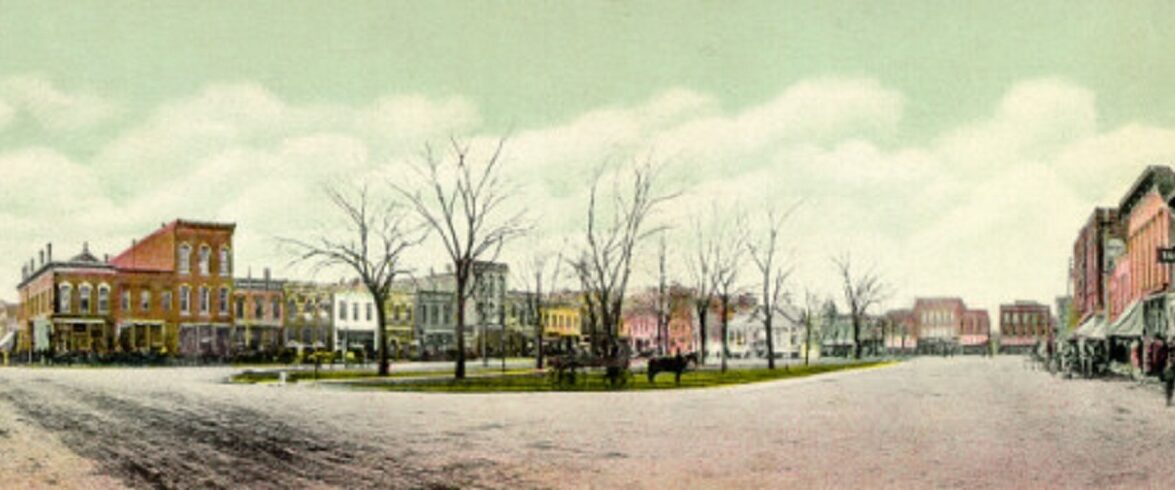R. C. Culton was the first manufacturer of plows in Canton. His establishment, while it was large for that period, was yet so small as not to have attracted attention outside of this immediate vicinity. It is therefore no injustice to Mr. Culton to mention as the originator of plow manufacturing in this county the name of:
WILLIAM PARLIN.
Mr. Parlin is a native of Massachusetts. He immigrated to Fulton county, landing at Copperas-Creek Landing on the 4th day of July, 1810. Mr. Parlin at this time was a young man, with no capital but a knowledge of his trade–blacksmithing,– and a full stock of that indomitable energy for which the New England character is celebrated. Not only was Mr. Parlin poor, but he was lame, and at the same time quiet, unassuming and retiring in his disposition–so much so that he attracted no attention. Mr. Parlin began work as a “jour.” for Mr. Culton, and finally, from his knowledge of his trade, became for a short period a partner with that gentleman, but soon dissolved the connection and rented a small shop on the south side of Elm Street, near his present manufactory. Here Mr. Parlin began to attract attention by his industry and skill. He considered himself too poor to employ a “helper” in his business, and, with characteristic ingenuity, made for himself a trip-hammer. This hammer was operated by Mr. Parlin’s foot. Many of our old citizens will remember this hammer.
While working here, Mr. Parlin married Miss Caroline Orendorff, in January, 1845. Miss Orendorff was a daughter of John Orendorff, Esq. In 1846 Mr. Parlin purchased from Maj. Lewis Bidamon his foundry, situated on Main street, corner of Walnut, on the ground now occupied by the residence of Wm. Seavey, Esq. Mr. Parlin began here the general foundry business, but made a few steel plows.
In January, 1848, this foundry burned to the ground, and proved a total loss, except a small amount of steel, which was not injured. This was considered a severe blow by Mr. Parlin, but did not discourage him. He now rented a fire in the blacksmith shop of John Culton, on Elm street, north side, between
Third and Fourth streets. Here he began the manufacture of plows, working up his small stock of steel, forging his plows at his shop; then wheeling them on a wheelbarrow to McPheters’s oil-mill, on Fourth street to a horse-power grindstone for grinding them, loading them again upon his wheelbarrow, he would wheel them through the streets to Charley Rockhold’s shop, Main Street between Elm and Jones streets, south of the Emory House
Thompson Maple, who was at that time the most enterprising and energetic of our business men, had been noticing the energy manifested by Mr. Parlin, and proposed to him a partnership. This arrangement was finally consummated, and the firm of Maple & Parlin was established for the manufacture of plows–
Maple furnishing the capital, and Parlin the skill. The new firm began business at the corner of Elm and Fourth streets, on the same corner where Mr. Parlin has since remained. This firm began business in the summer of 1846, only a few months after the fire which had apparently been so disastrous.
The firm of Maple & Parlin manufactured the steel mould-board plow, and were successful to a marked extent. Their success and Mr. Parlin’s present success may be attributed to the fact that every plow manufactured had to pass under the eye of Mr. Parlin, who personally selected all his timber and rejected
every stick that was deficient, allowing no work to leave his shop that was not done in the most substantial and workmanlike manner. They availed themselves constantly of every improvment in plows made by other establishments, and Mr. Parlin himself made the plow a study, thereby enabling himself to perfect many very valuable improvements by his own ingenuity. In 1848 or 1849, the firm of Maple & Parlin was dissolved by mutual consent, Mr. Maple retiring–Parlin now being able to stand alone. He continued alone until the 1st of January, 1852, when, finding his business increasing to so great an extent that he could no longer attend to his ofiice business and give the attention to the mechanical part of his business he desired, he took into partnership his brother-in-law Mr. Wm. J. Orendorff. This firm has continued since unchanged. The firm of Parlin & Orendorff continued gradually but constantly to extend their business and facilities for manufacturing, until they now rank among the first plow manufacturing establishments in the Union.
Their average force of workmen is now eighty men in constant employment. In the year 1870 they manufactured 8000 “Canton Clipper” Plows, 3000 “Parlin’s Cultivators,” and 600 Stalk-Cutters. Their plows are handled by dealers throughout the Western States, a considerable portion of the Southern States, the Pacific States, and all the Western Territories. In 1855 Messrs. Parlin & Orendorff took the first premium on plows over all competitors, at the State Fair held at Chicago, since which time they have succeeded in taking nearly every first premium for which they have competed.
This manufactory, it will be observed, has been the upgrowing of small business without capital, the result of indomitable energy, and an honest determination to turn out only first-class work. The poor blacksmith has now, at only fifty-three years of age, while still in the prime of life, become a great manufacturer –a Plow King, in fact. Parlin’s Plow Factory is considered by the people of Canton one of the institutions of the town of which they are proud, and well they may be.

